All Categories
Featured
Brakes are probably the most vital security function of any vehicle. Without trustworthy brakes, also the most effective car can come to be a risk on the roadway.
- The Significance of Normal Brake Inspections. Brakes go through constant wear and tear with every usage, whether you're driving at broadband on the freeway or travelling with city roads. Over time, brake pads, blades, and other parts wear down, which can influence stopping efficiency. Without routine inspections, you may not notice the steady decline in efficiency until it's as well late.
Regular brake evaluations allow you to capture problems early, making sure that your brakes stay receptive, reputable, and secure. Prompt examinations can additionally conserve you cash by attending to small issues before they come to be costly repair work.
- Common Indicators That Your Brakes Required Attention. While routine brake evaluations are very important, there are some warning indications you can look out for to understand when it's time to set up a check-up:
Squeaking or Grinding Appears: Piercing squeaks or grinding sounds when applying the brakes are often signs that your brake pads are broken and need replacement. Resonance or Pulsation: If you really feel resonances in the guiding wheel or the brake pedal, it could suggest warped blades, which might need resurfacing or replacing. Soft or Squishy Brake Pedal: If the brake pedal feels abnormally soft or spongy, there may be air in the brake lines or a problem with the master cyndrical tube. Drawing to One Side: If your auto pulls to one side while stopping, this can be caused by irregular brake pad wear or a concern with the brake liquid. Increased Quiting Distance: If it takes longer to quit than normal, it may show that the brake pads are worn, the fluid is low, or the rotors are harmed. If you observe any one of these signs and symptoms, it's finest to have your brakes checked instantly.

- Trick Elements Checked During Brake Inspections. Throughout a brake examination, a service technician will inspect several crucial parts of the stopping system to make certain everything is functioning effectively. Right here are the crucial elements entailed:
Brake Pads: One of the most common reason for inadequate braking efficiency is damaged brake pads. Evaluating the thickness of the pads is a top priority throughout every inspection. Brake Rotors: Blades ought to be smooth and devoid of grooves or splits. Any considerable damage to the blades can lead to compromised stopping efficiency and unequal pad wear. Brake Liquid: Low or infected brake fluid can hinder stopping efficiency. The professional will inspect the liquid degrees and top quality and change it if needed. Brake Lines and Tubes: Brake lines ought to be without leakages or splits. Any kind of damage to the lines can cause loss of brake liquid, causing brake failing. Brake Calipers: The calipers use pressure to the brake pads. They must be inspected for indications of wear or leakages to guarantee they are working properly. Regularly examining these elements aids keep your brake system in peak problem, enabling you to stop your cars and truck securely and effectively.
- Just how Frequently Should You Have Your Brakes Checked? The basic referral is to have your brakes inspected at the very least when a year or every 12,000 miles, depending upon your driving practices. Specific driving conditions might need even more frequent evaluations:
Rush Hour: If you usually drive in stop-and-go web traffic, your brake pads will use down quicker. Mountain Driving: Driving on high roads needs more regular stopping, which can trigger your brakes to put on quicker. Towing or Hauling Heavy Plenties: If you consistently carry hefty loads, your brakes will experience more stress and anxiety and require more constant evaluations. If you see any one of the warning signs discussed earlier, don't wait on the next scheduled inspection-- have your brakes examined immediately.
- The Effects of Ignoring Brake Inspections. Overlooking routine brake examinations can bring about major effects. A failing brake system could cause reduced stopping power, which boosts your threat of accidents. Disregarding brake upkeep can also cause more costly repairs. If you postpone replacing used brake pads, the damages might extend to the blades, leading to the demand for blades replacement, which is a much extra costly repair.
In the most awful situation, driving with damaged brakes can lead to finish brake failing, putting you and various other drivers in danger. Routine brake examinations are a small investment that can save your life and prevent expensive fixings.
- Verdict: Keep Safe with Routine Brake Inspections. Brakes are not something you wish to take chances with. A dependable stopping system is vital for risk-free driving, and routine brake assessments are a simple method to make sure that your vehicle stops when you need it most. By remaining on top of brake maintenance, enjoying for advising signs, and having your brakes examined at the advised intervals, you'll secure both your vehicle and your safety.
Do not wait up until your brakes start to fall short-- timetable routine brake inspections and maintain your lorry in ideal problem for years to come.
Latest Posts
Trusted Eye Center South - Nearby LASIK Exam: Take the First Step to Sharp Vision.
Trade-In Worth with Ron Marhofer Hyundai of Cuyahoga Falls
A Stress-Free Means to Offer Your Cars and truck
More
Latest Posts
Trusted Eye Center South - Nearby LASIK Exam: Take the First Step to Sharp Vision.
Trade-In Worth with Ron Marhofer Hyundai of Cuyahoga Falls
A Stress-Free Means to Offer Your Cars and truck
